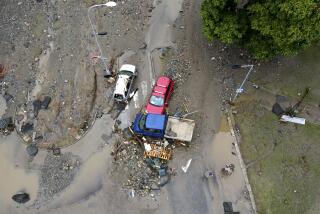Snow, Record Cold Paralyze Much of Europe
LONDON — Europe sank deeper into the chaos of one of the worst winters of the century as more heavy snow paralyzed much of the continent Wednesday, and a Siberian wind drove temperatures to record lows in several countries.
In France, snow fell on the Riviera, and near the Swiss border the temperature plummeted to 44 below zero Fahrenheit.
In Belgium, zookeepers took polar bears indoors. In London, maintenance workers installed heaters to thaw the chimes of Big Ben, frozen earlier in the week.
Troops Aid Snowbound
In the county of Kent, southeast of London, Gurkha troops were called out to deliver food to snowbound residents.
More than 150 weather-related deaths have been recorded in Europe since severe weather hit the Soviet Union and Eastern Europe two weeks ago, 29 of them Wednesday in the Caucasus Mountains of the Soviet Union.
The short-term forecast offered little prospect of immediate relief.
Transportation was severely impaired. Major highways were closed in several countries and rail service was either canceled or restricted. This development, coupled with the diversion of electric power supplies to meet unprecedented demand, reduced economic activity in Western Europe.
Reports from Eastern Europe indicated that the weather may have a more lasting impact on economic target levels.
Officials in Moscow said that Soviet power stations are running low on fuel because of disruptions on snowbound railroads. Leningrad registered a temperature of 49 below, the lowest on record, and Tass, the Soviet news agency, said the people of Leningrad were referring to unheated buses as “refrigerators on wheels.”
The weather figured in a parliamentary debate in Britain, where the government has proposed to subsidize heating bills for the elderly, and Neil Kinnock, the opposition leader, accused Prime Minister Margaret Thatcher of not doing enough.
Thatcher has already ordered immediate payment of a $7.50 subsidy for the elderly, to help cover added heating costs, and she has announced that charities assisting the elderly and the homeless will be eligible for government funds.
“We are determined that elderly people should keep warm through this extremely cold spell,” said John Major, the minister of state for social security.
Spirit of Camaraderie
Normally reserved Britons seemed to respond to the cold with a spirit of camaraderie that always seems to emerge in times of adversity.
When hundreds of motorists were stranded on the A1 highway near Belford, a few miles south of the Scottish border, townspeople came out with offers of food and lodging for the night.
Truck drivers hauling foodstuffs opened up their cargoes to help make the town’s supplies go around, and when the town’s power supply failed late in the day, area pubs offered candle-lit dinners.
“The welcome is great,” one trucker told a television cameraman, as motorists and townspeople toasted each other in the background. “I just hope we eventually get through.”
A major east-west highway across the north of England was closed, and traffic on most others was restricted to one lane in each direction. Policemen delivered hot coffee to stranded motorists. Elsewhere, volunteers delivered hot meals to the elderly.
Urged to Stay at Home
British Rail virtually halted London area commuter services Wednesday morning, effectively keeping 700,000 people from their work. The police in several regions urged residents to stay at home except in cases of life or death.
At least 13 persons died in Britain in the 48 hours ending late Wednesday, including a postman in Staffordshire who became lost in a blizzard and an 87-year-old woman who froze to death feeding birds outside her home in South Yorkshire.
Helicopters in the hard-hit eastern counties of England ferried a pregnant woman to a hospital, then transported medical supplies to other hospitals.
In France, the weather claimed five lives Wednesday, raising the two-day toll to 14. Premier Jacques Chirac ordered the army to help clear roads in the north of the country after one of the heaviest snowfalls on record.
Two Paris subway stations were opened to shelter the city’s estimated 10,000 homeless. Elsewhere, army barracks were opened to civilians needing shelter.
Frozen Railway Switches
In West Germany, frozen railway switches delayed trains in several cities. Frantic zookeepers in Frankfurt managed to corral a bear that had escaped from his enclosure by walking across a frozen moat.
As Europe’s major population centers continued to suffer in the harshest weather in years, freak weather conditions brought what amounted to a heat wave to normally frozen regions around the Arctic Circle.
In Iceland, the temperature reached a spring-like 50 degrees, and in parts of northern Sweden the temperature soared in the space of a few days from 44 below zero to 32 above.
“We almost had a heat stroke when the thermometer shot up,” a Swedish weather station employee told the Swedish News Agency.
More to Read
Sign up for Essential California
The most important California stories and recommendations in your inbox every morning.
You may occasionally receive promotional content from the Los Angeles Times.









